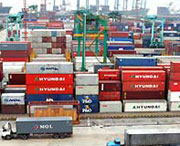|
 |
| A file photo taken on Deceber 9, 2004 shows the
operation of the port of Shanghai.(newsphoto)
|
China registered a 35.7 per cent surge in foreign trade last year,
accounting for US$1.15 trillion exchanged, to become the world's third
largest trading power behind the United States and Germany.
According to the Ministry of Commerce, exports last year ballooned to
US$593.4 billion, reflecting a year-on-year increase of 35.4 per cent.
Imports rose 36 per cent to US$561.4 billion.
The yearly surplus came to US$32 billion, compared with US$25.5 billion
in the previous year.
The nation underwent a trade deficit from January to August.
"China's imports rose sharply in the first half of the year," said Fan
Ying, a professor with Beijing's Foreign Affairs University. "Blistering
fixed-asset investments in certain sectors such as steel, real estate and
construction have demand for raw materials soaring."
"Prices for steel, rubber, plastics and cotton have also skyrocketed,"
she said.
In April, the Chinese Government launched efforts
to clamp down on
overheated investment in selected sectors such as steel, alumina and
cement.
Credit tightening and scrutiny over approval of land deals soon cooled
down the investment spree and placed the growth of imports at a reasonable
level.
Economists cited market liberalization and brisk economic growth, as
the major reasons behind the strong growth of foreign trade.
"Chinese companies and individuals have been able to receive trading
rights through registering since July 2004," said Fan Ying. "That has
injected vigour in the market for millions of private, small and
medium-sized enterprises."
And overseas firms have been allowed greater access to the nation's
trading markets with shareholder requirements loosening.
At present, about 60 per cent of China's foreign trade is conducted
through foreign-invested and private companies.
When the trade volume surpassed a landmark of US$1 trillion in
November, Chong Quan, Ministry of Commerce spokesman, said China was set
to follow the United States and Germany to become the world's third
largest trader by volume.
"China is a 'large' trader," he said.
But he confessed that the nation still has a long way to go before it
becomes a "strong" trading power, since the country lacks a competitive
global sales network and branded goods.
Minister of Commerce Bo Xilai last month urged Chinese exporters to
enhance the quality and added value of their goods in a bid to sustain
export growth.
Looking forward to this year's trade scenario, market observers say the
growing momentum will remain strong, with global and domestic economic
climates both conducive to China.
"China's opening-up of its markets to meet World Trade Organization
commitments, domestic economic growth and the rallying of major world
economies like the United States, Japan and the euro-zone, all bode well
for Chinese imports and exports this year," Fan said.
(Agencies) | 